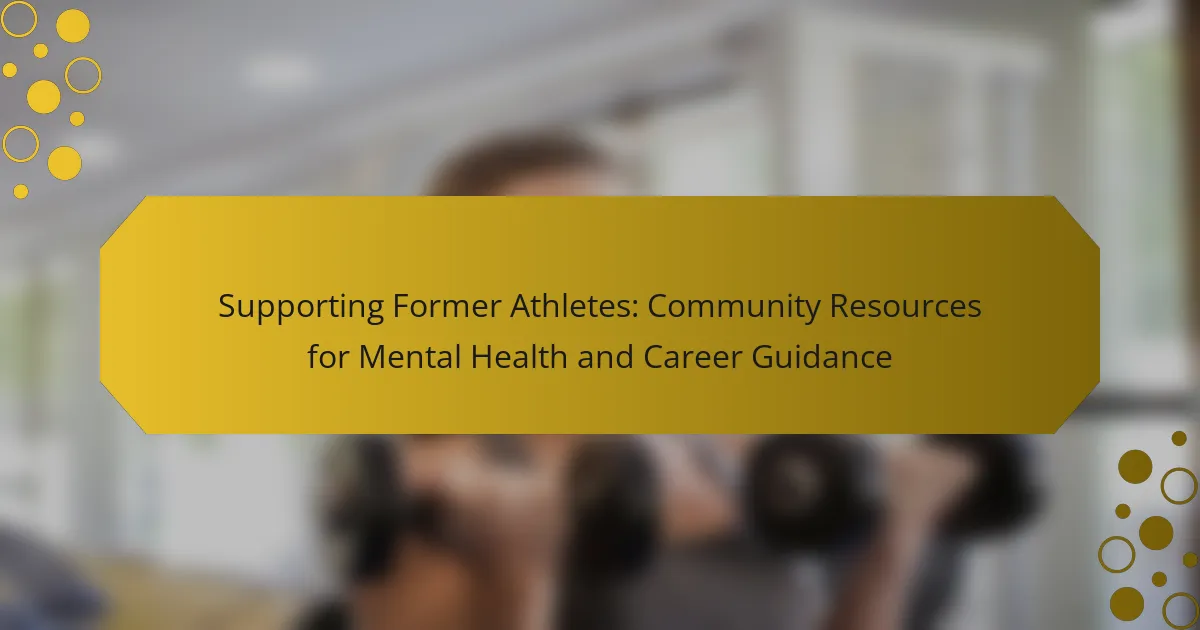Former athletes often face challenges like identity loss and anxiety after their sports careers end. Community resources such as counseling services, peer-led support groups, and career transition programs offer essential support. Online platforms provide valuable information and networking opportunities. Engaging with these resources can significantly enhance mental well-being and facilitate successful career transitions.
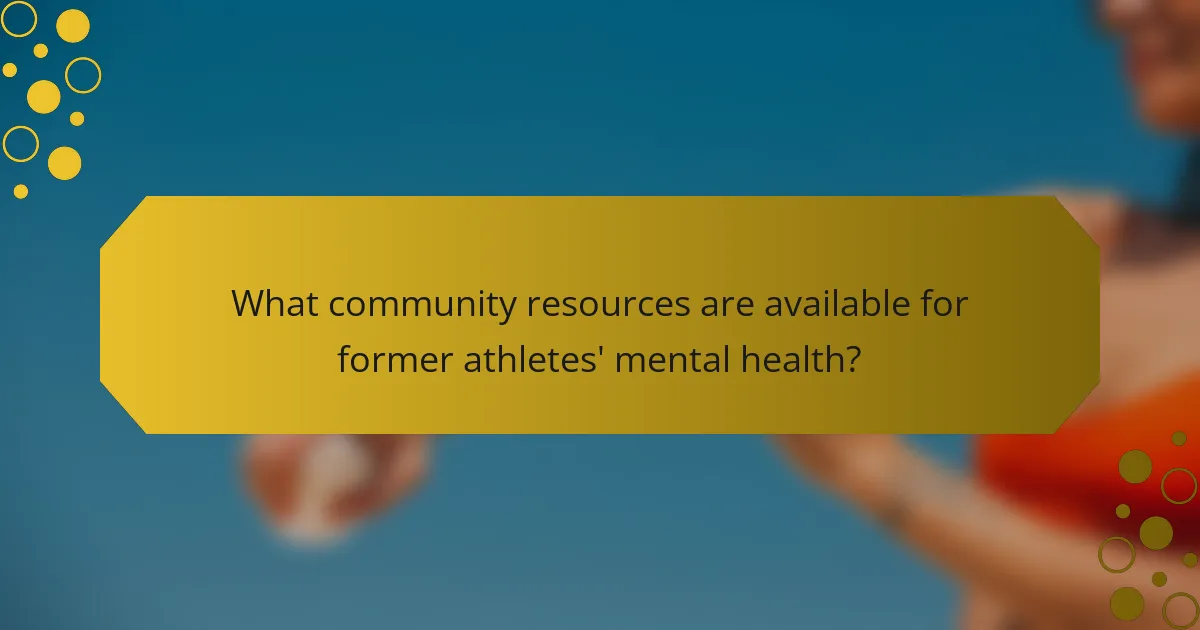
What community resources are available for former athletes’ mental health?
Various community resources support former athletes’ mental health, including counseling services, support groups, and career transition programs. These resources focus on emotional well-being and professional guidance.
1. Counseling Services: Many organizations offer mental health counseling tailored for former athletes, addressing issues like identity loss and anxiety.
2. Support Groups: Peer-led support groups provide a space for sharing experiences and coping strategies, fostering community and connection.
3. Career Transition Programs: Specialized programs assist former athletes in navigating career changes, offering workshops and mentorship.
4. Online Resources: Websites and forums dedicated to athlete mental health provide valuable information and community support.
5. Nonprofits: Organizations like the Athlete Assistance Program focus on mental health education and access to resources for athletes in transition.
How do local organizations support mental health initiatives?
Local organizations play a crucial role in supporting mental health initiatives for former athletes by providing resources and guidance. They offer counseling services, workshops, and networking opportunities tailored to the unique challenges athletes face during transitions. These organizations often collaborate with mental health professionals to create programs that address issues such as anxiety, depression, and identity loss. Additionally, they promote awareness and reduce stigma around mental health through community events and outreach efforts, fostering a supportive environment for athletes seeking help.
What role do sports psychologists play in the transition?
Sports psychologists play a crucial role in helping former athletes navigate their transition to life after sports. They provide support through mental health counseling, coping strategies, and career guidance tailored to individual needs. This support can reduce anxiety and depression, which are common during this challenging period. Additionally, they assist in developing new identities outside of athletics, fostering resilience and adaptability. By addressing psychological aspects, sports psychologists enhance overall well-being and facilitate smoother transitions into new careers or personal pursuits.
What are the steps to finding a qualified sports psychologist?
To find a qualified sports psychologist, follow these steps:
1. Identify your specific needs related to mental health and career guidance.
2. Research local sports psychology professionals through online directories or referrals from coaches and athletic organizations.
3. Verify credentials, ensuring they have relevant certifications and experience working with former athletes.
4. Schedule initial consultations to assess compatibility and approach to treatment.
5. Evaluate their communication style and understanding of the unique challenges faced by former athletes.
6. Make a decision based on your comfort level and their expertise in addressing your specific concerns.
What peer support networks exist for former athletes?
Peer support networks for former athletes include organizations like Athletes for Hope, which connects athletes with community service opportunities, and the Professional Athletes Foundation, offering resources for mental health and career transitions. Additionally, the Players’ Tribune provides a platform for athletes to share their stories and experiences, fostering a supportive community. These networks aim to address the unique challenges faced by former athletes, promoting mental well-being and career guidance.
How can former athletes connect with these networks?
Former athletes can connect with networks through various community resources. Local sports organizations often provide mentorship programs, while online platforms focus on career guidance and mental health support. Engaging in workshops and seminars helps build connections with peers and professionals. Networking events tailored for former athletes foster relationships that can lead to new opportunities.
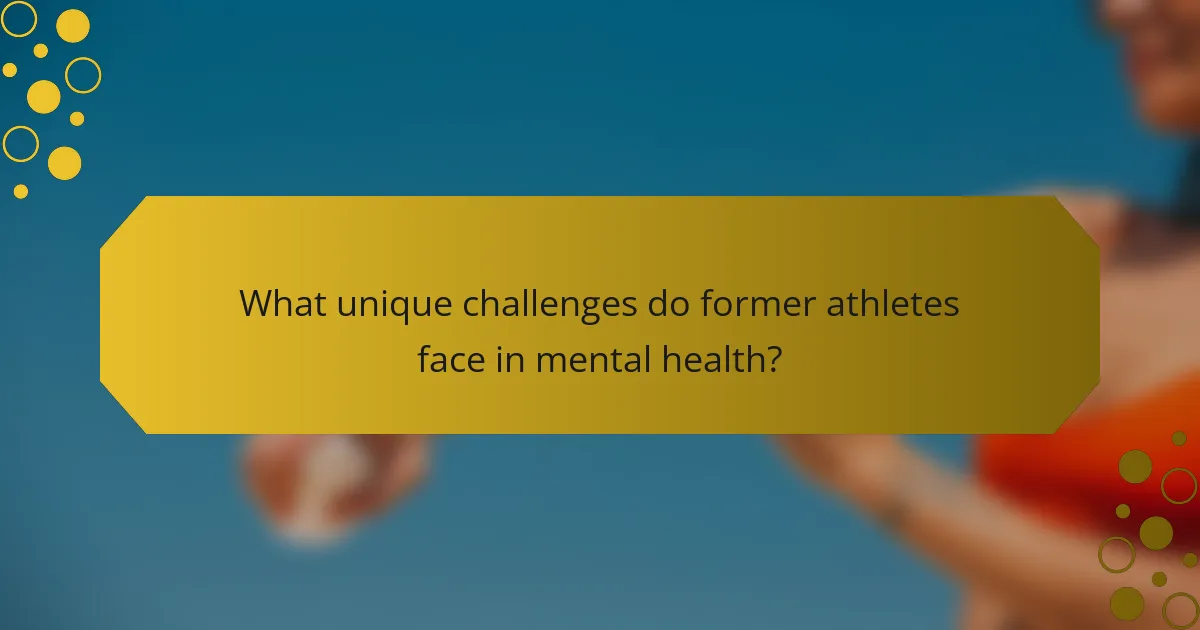
What unique challenges do former athletes face in mental health?
Former athletes face unique mental health challenges, including identity loss and pressure to succeed. Transitioning from competitive sports can create feelings of isolation and depression. Many struggle with adjusting to a new lifestyle and finding purpose outside of athletics. Community resources, such as counseling and support groups, can provide essential guidance and connection. These resources help address the emotional toll of retirement and promote mental well-being.
How does identity loss impact mental well-being?
Identity loss significantly affects mental well-being by leading to feelings of confusion, depression, and anxiety. For former athletes, this transition can be particularly challenging as they navigate changes in self-perception and purpose. Community resources play a crucial role in providing support, offering counseling, and facilitating career guidance to help individuals rebuild their identities. Research indicates that engaging with supportive networks enhances resilience and promotes mental health recovery. Accessing these resources can mitigate the adverse effects of identity loss, fostering a sense of belonging and purpose.
What are the common mental health issues among former athletes?
Common mental health issues among former athletes include anxiety, depression, and identity crises. Many athletes struggle with these challenges due to the transition from competitive sports to everyday life. Research indicates that approximately 30% of former athletes experience significant psychological distress. The unique attribute of having a public persona can exacerbate these issues, as former athletes may feel pressure to maintain an image. Community resources, such as support groups and mental health counseling, play a vital role in aiding recovery and adjustment.
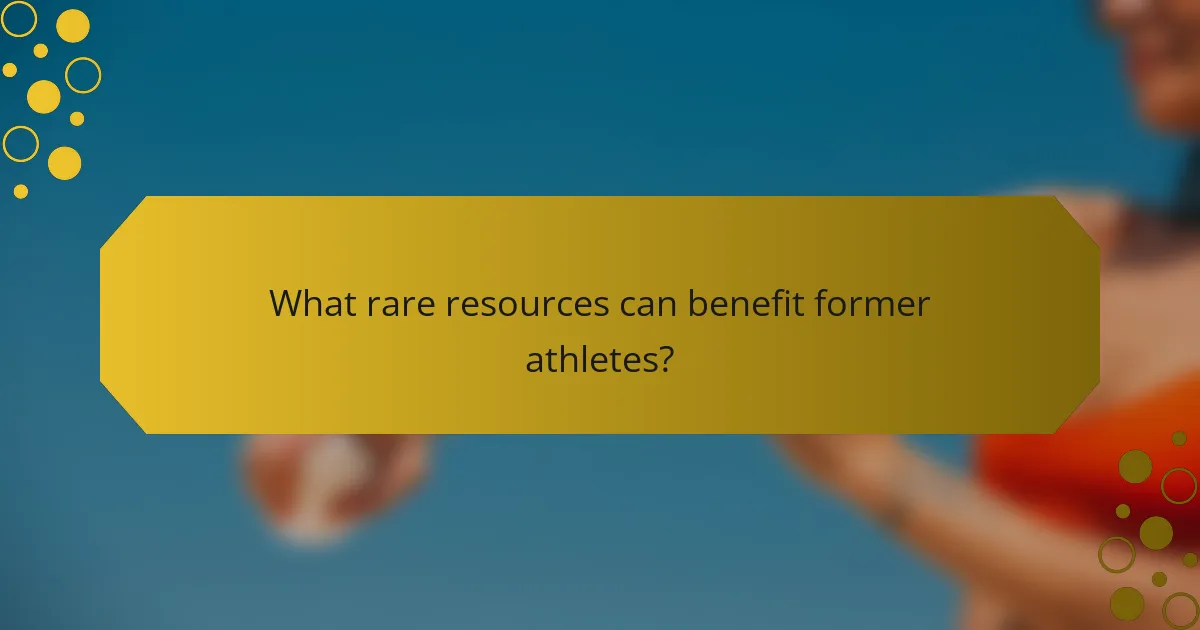
What rare resources can benefit former athletes?
Former athletes can benefit from rare resources like specialized mental health programs, mentorship networks, and career transition workshops. These resources address unique challenges faced after sports careers, providing tailored support for mental well-being and professional development. Access to peer support groups can also be invaluable, creating a sense of community and shared experience.
What specialized programs are available for career transitions?
Various specialized programs assist former athletes in career transitions. These programs offer tailored support, including mentorship, vocational training, and mental health resources. Organizations like the Professional Athlete Transition Institute provide comprehensive career coaching and job placement services. Additionally, the Athlete Transition Program focuses on mental health support, helping athletes navigate the emotional challenges of transitioning to new careers. Programs often include workshops on resume building and interview skills, enhancing job readiness for former athletes.
How do mentorship programs work for former athletes?
Mentorship programs for former athletes provide guidance and support in transitioning to post-sport careers. These programs connect athletes with experienced mentors who offer advice on career choices, mental health, and personal development. Athletes benefit from tailored resources that address unique challenges faced after competitive sports. Programs often include networking opportunities, workshops, and access to mental health professionals, enhancing overall well-being and career readiness.
What innovative mental health apps cater to athletes?
Innovative mental health apps for athletes include Headspace, Calm, and MyFitnessPal. These platforms provide tailored resources for mental wellness, mindfulness, and stress management, catering specifically to athletes’ unique challenges. Headspace offers guided meditations focusing on performance enhancement, while Calm emphasizes relaxation techniques. MyFitnessPal integrates nutrition tracking with mental health support, promoting overall well-being. These apps are increasingly essential in addressing the mental health needs of athletes, particularly former athletes transitioning to new careers.
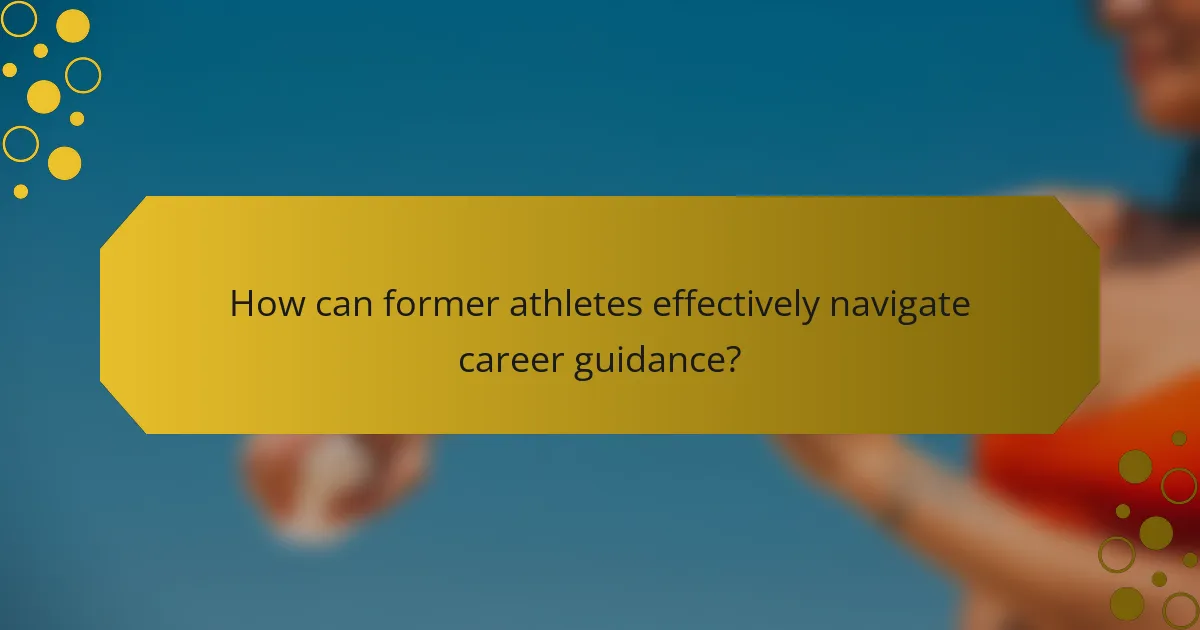
How can former athletes effectively navigate career guidance?
Former athletes can effectively navigate career guidance by utilizing community resources tailored to their unique experiences. Engaging with local support groups offers networking opportunities and mentorship. Online platforms provide access to career coaching specifically designed for athletes, focusing on transferable skills. Workshops and seminars can enhance job search techniques and resume building. Additionally, mental health services help manage the emotional transition from sports to professional life.
What are the best practices for seeking career advice?
Seek career advice from mentors, professional networks, and community resources tailored for former athletes. Utilize platforms that specialize in mental health and career guidance, as they understand unique challenges faced by athletes transitioning to new careers. Engage in workshops and seminars that focus on skill development and networking opportunities. Leverage social media to connect with industry professionals and join relevant groups for support and insights.
How can networking enhance career opportunities for former athletes?
Networking significantly enhances career opportunities for former athletes by connecting them with industry professionals and resources. Building relationships can lead to mentorship, job referrals, and access to exclusive opportunities. Former athletes often possess unique skills such as teamwork and discipline, which can attract employers. Engaging in networking events allows them to showcase these attributes and gain insights into potential career paths, fostering a supportive community that emphasizes mental health and career guidance.
What strategies can be employed to build a professional network?
Building a professional network involves strategic relationship development. Engage with community resources tailored for former athletes to foster connections.
Participate in workshops and seminars focused on career guidance and mental health. These events provide networking opportunities and insights into industry trends.
Leverage online platforms like LinkedIn to connect with professionals in relevant fields. Regularly update your profile and share experiences to attract potential contacts.
Join local or virtual support groups for former athletes. These communities offer a safe space to share experiences and can lead to valuable networking opportunities.
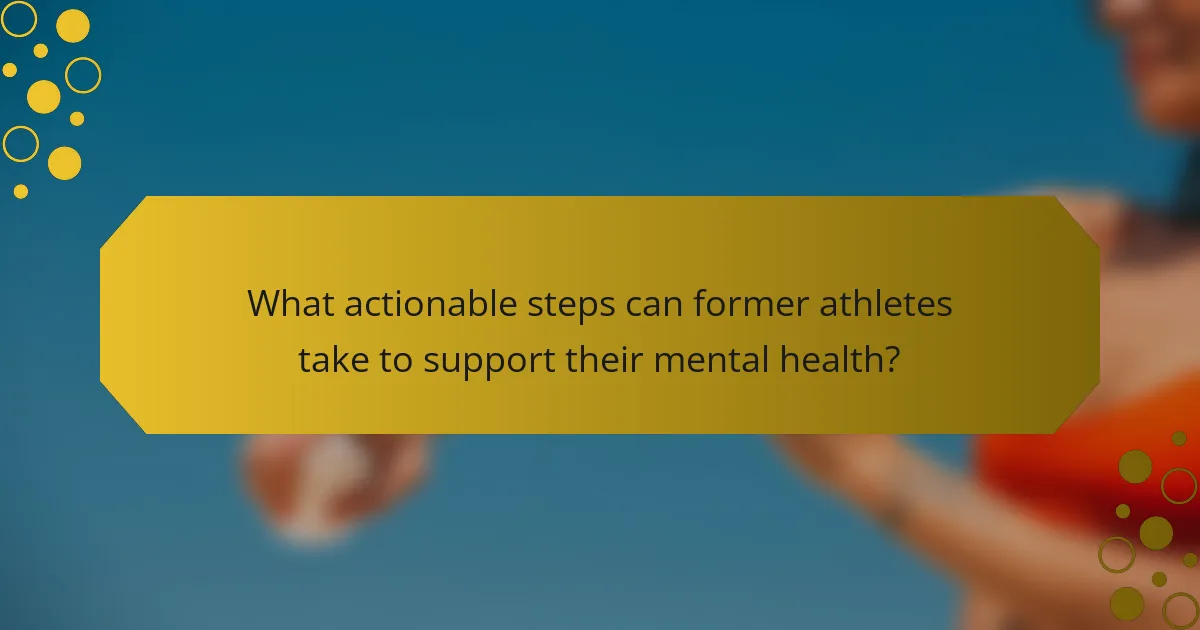
What actionable steps can former athletes take to support their mental health?
Former athletes can support their mental health by engaging with community resources, seeking professional guidance, and fostering connections. Joining support groups offers a platform for sharing experiences and coping strategies. Participating in workshops can enhance skills for career transitions. Regular physical activity, such as group sports or fitness classes, promotes mental well-being. Establishing a routine that includes mindfulness practices can also be beneficial. Lastly, accessing mental health services ensures professional support tailored to individual needs.
What common mistakes should former athletes avoid in their mental health journey?
Former athletes should avoid neglecting mental health resources, isolating themselves, and underestimating the impact of identity loss. Seeking support from mental health professionals and engaging with community resources can provide essential guidance. Acknowledging emotional challenges and maintaining social connections are crucial for a successful transition.
What are the top tips for maintaining mental health post-athletics?
To maintain mental health post-athletics, engage with community resources, seek professional guidance, and build supportive networks. Establishing connections with former athletes can provide valuable insights and emotional support. Regularly participating in mental health workshops or counseling can help address challenges faced during transitions. Additionally, focusing on new career paths or hobbies fosters a sense of purpose and belonging.
